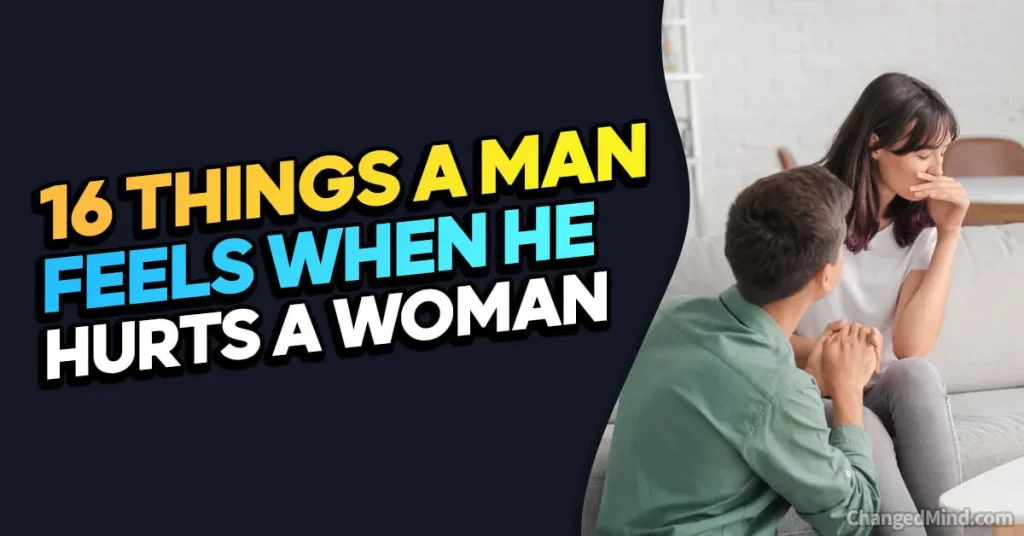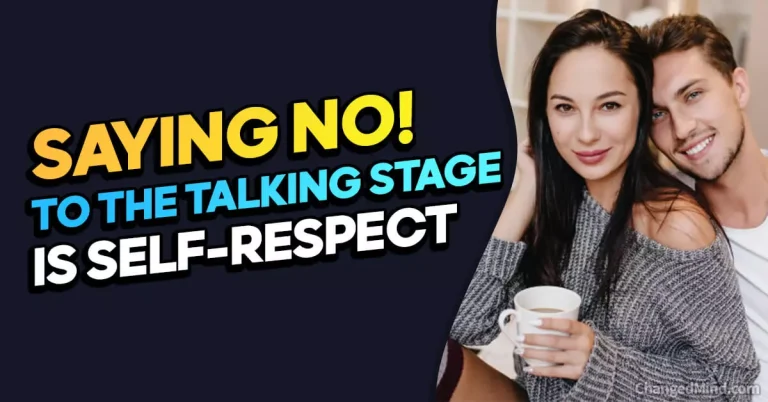Ladies and gentlemen, gather round for a moment of truth: the male psyche is a complex maze of emotions, quirks, and the occasional uncontrollable urge to quote cheesy movie lines. Now, imagine stirring that enigmatic brew with a dash of remorse and a sprinkle of guilt.
Welcome to the rollercoaster of “Things a Man Feels When He Hurts a Woman.” You might be wondering, “Why would I care?” Well, because beneath the bravado and well-tailored flannel shirts, men, too, have a heart that can unexpectedly go from “Mission Accomplished” to “Houston, We Have a Problem.”
Short Answer:
In a nutshell, when a man unintentionally hurts a woman, it’s like a symphony of emotions erupting from a Pandora’s box of feels. But fret not! In this article, we’re cracking open the secret diary of the male psyche to uncover those moments of vulnerability, confusion, and sincere reflection.
Why Keep Reading:
Gentlemen, brace yourselves for a journey that promises laughter, “aha” moments, and a deeper understanding of the male side of emotional turbulence. Ladies, prepare to nod knowingly as we delve into the uncharted territory of what goes on in his head when things go awry.
Key Points We’ll Discuss:
- The Echoes of Regret: That moment when the realization hits like a ton of bricks.
- The Quest for Redemption: The intricate dance between apology and action.
- The Silence of Guilt: How guilt can morph into silence and withdrawal.
- The Blame Game: Navigating the treacherous waters of assigning fault.
- The Mirror of Empathy: Finding parallels in his own experiences.
- The Self-Inflicted Wound: When his own hurt doubles the heartache.
- The Crusade for Understanding: Seeking the elusive “why” behind the hurt.
So, whether you’re seeking insights, a dose of humor, or just curious about the lesser-explored corners of emotional turbulence, you’re in for a treat. From cringe-worthy mishaps to surprising bursts of sentiment, we’re about to demystify the symphony of emotions that resonate when a man accidentally hurts a woman. Fasten your seatbelts, dear readers – it’s time to embark on a journey of emotional exploration! 🚀❤️
Understanding the Impact:
When a man hurts a woman, it is essential to understand the emotional and psychological toll it can have on both individuals involved. Exploring a man’s feelings in such situations is crucial for several reasons. By delving into their emotions, we can gain insights into the impact of their actions, foster empathy, and work towards building healthier relationships.

It is important not to generalize or assume that all men feel the same way, as emotional responses can vary. Acknowledging and addressing the complex emotions that can arise is an important step towards healing and growth for both parties involved.
Key takeaway:
- Understanding the Impact: Exploring a man’s feelings is important to understand the impact of his actions on women.
- The Emotional Turmoil: Hurting a woman can lead to feelings of guilt, regret, remorse, shame, sorrow, sadness, empathy, compassion, fear, and anxiety in a man.
- Reflection and Self-Realization: Men may recognize the consequences of their actions, question their personal values, seek ways to make amends, and learn and grow from hurting a woman.
- Moving Towards Healing: It is important for a man to apologize, take responsibility, communicate and listen to the woman’s perspective, seek professional help if needed, and commit to personal growth and change.
- Creating a Culture of Respect: Promoting education and awareness, challenging gender stereotypes, and encouraging mutual understanding and support can help create a culture of respect towards women.
Understanding the Impact:

Understanding the impact of hurting a woman is crucial to foster empathy and make positive changes in society. Let’s delve into the emotional, physical, and psychological effects.
Emotional Impact:
Hurting a woman can have devastating emotional effects. It can lead to betrayal, sadness, anger, and fear. Studies show that emotional abuse can cause depression and anxiety symptoms in 1 in 3 women.
Physical Impact:
The physical impact of hurting a woman can vary based on the severity of the abuse. It can range from bruises and broken bones to more serious injuries like concussions or death. Domestic violence alone takes the lives of thousands of women each year.
Psychological Impact:
Hurting a woman can result in long-term trauma and mental health issues. Victims may develop PTSD, low self-esteem, and struggle to trust others. They may also experience flashbacks and nightmares related to the abuse.
Understanding the impact of hurting a woman goes beyond statistics and research. It requires acknowledging the experiences of survivors. One such story is Sarah’s, who endured emotional and physical abuse in a previous relationship.
The impact on her was immense – she lost her self-worth, lived in constant fear, and struggled to trust others. With therapy and a strong support network, Sarah was able to heal and rebuild her life. Her story shows the resilience of survivors and the lasting impact of hurting a woman.
Why is it Important to Explore a Man’s Feelings?
Exploring a man’s feelings is important for several reasons. It helps us understand his emotions, promotes empathy, and compassion, and facilitates personal growth and change.
Understanding emotions is crucial in comprehending a man’s actions and reactions in different situations. This understanding allows us to connect on a deeper level and fosters more meaningful relationships.
By exploring a man’s feelings, we can cultivate empathy and compassion, putting ourselves in his shoes and understanding what he might be going through. This understanding leads to a more supportive and caring approach, improving communication and conflict resolution.
Exploring a man’s feelings facilitates personal growth and change as he gains self-awareness and a better understanding of himself. It provides an opportunity for reflection and self-realization, helping him recognize the consequences of his actions and assess his personal values. This process can lead to growth and positive change, benefiting both himself and his relationships.
When a man’s feelings are explored and validated, it creates trust and openness, ultimately building healthier and more fulfilling relationships. Honest and authentic communication is encouraged, allowing a man to express himself more effectively and understand the emotions of others. This fosters mutual understanding and support.
Exploring a man’s feelings is crucial for promoting emotional well-being and nurturing meaningful connections.
The emotional turmoil: Where guilt and regret reside, like unwelcome guests overstaying their welcome at a pity party.
16 Things a Man Feels When He Hurts a Woman
Here are 16 things that a man might feel when he unintentionally hurts a woman:
1. The Sting of Regret: A sharp pang of remorse that lingers long after the moment has passed.
2. The Weight of Guilt: Like carrying around a heavy burden that won’t let him forget.
3. The Echoes of Apology: Replaying his words, wishing he could take them back.
4. The Rush of Confusion: Wrestling with mixed emotions and wondering how it all went wrong.
5. The Shadow of Doubt: Questioning his actions, intentions, and impact.
6. The Silence of Awkwardness: A deafening quiet that follows an unintended hurt.
7. The Tug of Empathy: Feeling her pain as if it were his own.
8. The Urge to Fix: A burning desire to mend what’s been broken.
9. The Dance of Explanation: Struggling to put feelings into words that make sense.
10. The Tempest of Anguish: A storm of emotions, from frustration to sadness.
11. The Hesitation of Distance: Unsure whether to give space or bridge the gap.
12. The Quest for Forgiveness: Seeking redemption and hoping for understanding.
13. The Reflection of Growth: Vowing to learn from mistakes and be better.
14. The Dilemma of Time: The slow process of healing, wishing for a fast-forward button.
15. The Hope for Resolution: Longing for a chance to make things right.
16. The Renewed Connection: The joy of reconciliation and the bonds that grow stronger through adversity.
The Emotional Turmoil:
The emotional roller coaster of hurting a woman can leave a man grappling with a whirlwind of feelings. From guilt and regret to remorse and shame, sorrow and sadness to empathy and compassion, and even fear and anxiety, this section delves into the depths of the emotional turmoil experienced by a man in such situations.
Explore the range of emotions and complexities that arise from these circumstances, shedding light on the inner emotional world that accompanies hurting a woman.
Guilt and Regret
Feeling guilt and regret is common when a man hurts a woman. These emotions stem from recognizing wrongdoing and assuming responsibility for the pain caused. Understanding their impact is crucial for effective resolution.
1. Guilt: Guilt arises when a man realizes his actions have harmed another person. It can manifest as a heavy feeling in the chest or a constant nagging thought. The intensity of guilt varies with the severity of the harm caused.
2. Regret: Regret accompanies guilt and involves remorse for past actions. The man may wish to undo the hurt he caused. Regret emphasizes the desire for change and the importance of learning from mistakes.
To effectively address guilt and regret, a man should:
– Accept responsibility: Acknowledging one’s role in causing harm is essential for personal growth and healing.
– Reflect on the consequences: Understanding the impact on the woman and others involved fosters empathy and compassion.
– Seek ways to make amends: Taking concrete steps to rectify the situation, if possible, can alleviate guilt and regret. This may involve offering a sincere apology and actively working towards positive change.
– Learn and grow: Use the experience for self-reflection and personal growth. Understanding the root causes of harmful behavior can prevent similar situations in the future.
By addressing guilt and regret meaningfully, a man can contribute to healing and foster a culture of respect. It is important to remember that growth and change are possible. Committing to personal development and creating positive relationships based on mutual understanding and support is essential.
Remorse and Shame
Remorse and shame are powerful emotions that can be experienced by a man when he realizes the impact and harm his actions have caused to a woman. These emotions arise from a sense of regret, guilt, and recognition of the hurt inflicted. Understanding and addressing these feelings is crucial for healing and growth.
1. Remorse: Remorse is a feeling of deep regret and sorrow for one’s actions. It is a catalyst for change and a commitment to make amends.
2. Shame: Shame is a powerful emotion that arises when a person feels humiliation and disgrace for their behavior. It motivates taking steps to address behavior and learn from mistakes.
Confronting these emotions instead of suppressing or ignoring them is crucial. By acknowledging and owning remorse and shame, a man can begin the process of self-reflection and growth. This involves recognizing the consequences of actions, questioning personal values, and seeking ways to make amends.
There was once a man who deeply regretted his past actions and felt profound shame. He had hurt a woman with his words and actions, causing her pain and suffering. As he reflected on his behavior, he realized the profound impact it had on her emotional well-being.
Filled with remorse and shame, he took responsibility for his actions. He apologized sincerely to the woman, expressing his deep remorse and the changes he had made to prevent such behavior from happening again.
He committed himself to personal growth and sought professional help to understand the root causes of his harmful behavior. Through therapy, he developed empathy and compassion towards others, cultivating a healthier understanding of relationships.
In his healing journey, he became an advocate for education and awareness about the importance of treating others with respect. He actively challenged gender stereotypes and worked towards fostering a culture of mutual understanding and support.
His story serves as a powerful reminder that remorse and shame can lead to transformative change. By confronting and addressing these emotions, he learned from his mistakes, grew as an individual, and contributed to creating a more respectful and compassionate society.
Finding humor in a man’s sorrow and sadness may be twisted, but it’s the only way I can cope with my own emotions.
Sorrow and Sadness
“When a man hurts a woman, sorrow and sadness are common emotions that arise. These feelings are rooted in regret and empathy for the pain caused. It is crucial to acknowledge and address these emotions in order to facilitate healing and personal growth.
1. Sorrow: Sorrow is a profound sense of sadness and grief. When a man realizes the impact of his actions on a woman, he may experience deep sorrow. This sorrow stems from recognizing the hurt and damage inflicted upon the relationship. It is vital for the man to fully embrace this sorrow and allow himself to feel the weight of his actions.
2. Sadness: Sadness is characterized by emotional pain and melancholy. When a man hurts a woman, he may feel intense sadness as he realizes the harm he has caused. This sadness reflects remorse and regret for his actions. It is important for the man to sit with this sadness and process it in a healthy manner.
Addressing both sorrow and sadness is essential for personal growth and healing. Doing so enables the man to acknowledge the consequences of his actions and take responsibility for them. By fully experiencing these emotions, the man can reflect on his behavior, question his values, and seek ways to make amends. Through introspection and self-realization, the man can learn from his mistakes and grow.
To embark on the path of healing, the man must sincerely apologize and take full responsibility. Effective communication and active listening are crucial in rebuilding trust and understanding. Seeking professional help, such as therapy or counseling, can provide guidance and support. Committing to personal growth and change is essential to prevent similar actions in the future.
By promoting respect, education, challenging gender stereotypes, and encouraging mutual understanding and support, society can prevent hurtful behavior and foster healthier relationships.
Empathy and Compassion
Empathy and compassion are crucial when understanding a man’s impact on relationships. They play a significant role in healing and building trust. Here are some important points to consider when exploring empathy and compassion in the context of a man hurting a woman:
1. Acknowledging emotions: Empathy involves recognizing and understanding the emotions of the hurt woman. It requires actively listening, validating her feelings, and showing genuine concern for her well-being.
2. Putting oneself in her shoes: Compassion goes beyond understanding to imagining oneself in the woman’s position. It involves cultivating care and a desire to alleviate her pain. By putting oneself in her shoes, a man can better grasp the emotional impact of his actions.
3. Expressing remorse and regret: Demonstrating empathy and compassion requires sincere remorse for the hurt caused. A man should take responsibility, apologize genuinely, and seek forgiveness. This helps validate the woman’s emotions and rebuild trust.
4. Offering support and understanding: Empathy and compassion involve providing support and understanding through active listening and open communication. This means allowing the woman to express her feelings without judgment and showing a willingness to make amends.
5. Committing to personal growth and change: To truly demonstrate empathy and compassion, a man should commit to personal growth and change. This involves reflecting on one’s behavior, questioning personal values, and actively seeking ways to prevent similar incidents in the future.
By embodying empathy and compassion, a man can begin the healing process and work towards creating a culture of respect and understanding in relationships. It is crucial to remember that empathy and compassion should be genuine and consistent to foster healthy and respectful connections.
Fear and Anxiety
Fear and anxiety are common emotions men experience when they hurt a woman. These feelings arise from guilt, remorse, and the fear of losing the relationship or causing further harm.
Fear stems from uncertainty about the consequences of their actions. Men may fear losing trust, ending the relationship, or facing negative consequences. Anxiety manifests as worry, restlessness, and unease. Men may worry about the woman’s reaction or potential backlash from others.
To address fear and anxiety, men must take responsibility and sincerely apologize. Open and honest communication with the woman can help alleviate anxiety and provide clarity. Seeking professional help like therapy or counseling can also be beneficial.
Creating a culture of respect is essential in preventing harmful actions and reducing fear and anxiety. Promoting education about healthy relationships, consent, and challenging gender stereotypes fosters mutual understanding and support.
Looking inward, a man reflects on the consequences of his actions, questioning his personal values and seeking ways to make amends.
Reflection and Self-Realization:
When it comes to hurting a woman, reflection and self-realization are crucial steps towards growth and change. In this section, we’ll explore the journey of recognizing the consequences, questioning personal values, seeking ways to make amends, and ultimately learning and growing from our mistakes.
Let’s delve into the uncomfortable yet necessary process of self-reflection, where we confront the impact of our actions and take responsibility for our role in hurting someone we care about.
Recognizing the Consequences
Recognizing the consequences is crucial to understanding the impact of hurting a woman. It involves taking responsibility for one’s actions and understanding the negative outcomes that result. Here are some key points to consider:
- Understand the impact: Acknowledging the harm and damage caused by one’s actions towards a woman is essential in recognizing the consequences. It involves comprehending the emotional, psychological, and physical impact inflicted upon her.
- Cultivate empathy and remorse: Developing empathy and feeling remorse for the pain caused are essential aspects of recognizing the consequences. It involves genuinely understanding and acknowledging the hurt and suffering experienced by the woman.
- Take ownership: Taking full ownership of one’s actions without making excuses or shifting blame is a crucial part of acknowledging the consequences. It means accepting personal responsibility for the harm caused.
- Learn from mistakes: Utilizing the experience as an opportunity for growth and learning is a part of recognizing the consequences. Understanding the impact of one’s actions and striving to never repeat them in the future is important.
- Seek forgiveness: Expressing sincere apologies and actively seeking forgiveness from the woman who was hurt is an integral part of recognizing the consequences. It involves understanding the need for reconciliation and actively working to make amends.
- Change behavior: Truly recognizing the consequences requires committing to personal growth and change. Actively working on oneself to address problematic behaviors and attitudes that led to hurting a woman is crucial.
- Make long-term commitments: Recognizing the consequences is not a one-time action. Making long-term commitments to respect and treat women with dignity and equality is essential. Actively working towards creating a culture of respect and challenging harmful gender stereotypes is important.
Recognizing the consequences is an essential step towards personal growth and development. It requires empathy, ownership, and a commitment to change. By understanding and acknowledging the negative impact caused by hurting a woman, individuals can take the necessary steps to become better partners, allies, and advocates for gender equality.
Questioning Personal Values
When a man hurts a woman, it is essential for him to question his personal values. This self-reflection plays a crucial role in his personal development and understanding the impact of his actions on both the woman involved and society as a whole.
One of the key aspects of questioning personal values is evaluating one’s moral compass. It involves reflecting on the beliefs and principles that guide one’s behavior. By examining these values, a man can gain valuable insight into the factors that influenced his previous actions and assess whether those values align with respect, empathy, and equality.
In addition to evaluating moral values, questioning personal values also involves assessing one’s attitudes and beliefs towards women. It requires confronting any deep-seated prejudices or discriminatory beliefs that may have contributed to harmful behavior. By challenging these attitudes, a man can actively work towards dismantling gender stereotypes and fostering a culture of respect and equality.
Understanding empathy and consent is crucial. It is important for a man to evaluate his understanding of empathy and how it relates to the harm caused. Recognizing and assessing one’s understanding of consent is also vital. This understanding helps to acknowledge the significance of active and enthusiastic participation, ensuring that boundaries are respected.
Another important aspect of questioning personal values is reevaluating relationship dynamics. This includes examining power imbalances, communication patterns, and expectations within relationships. By recognizing and addressing unhealthy dynamics, a man can strive to cultivate equal and mutually supportive relationships.
Questioning personal values should not stop at introspection; it should lead to actionable change. A man must commit to personal growth and actively work towards rectifying the harm caused. This may involve seeking education, therapy, or counseling to unlearn harmful behaviors and develop healthy coping mechanisms.
By consistently questioning personal values, a man can take responsibility for his actions, acknowledge the consequences, and actively contribute to creating a more respectful and equal society. This process requires self-awareness, a genuine commitment to change, and a willingness to grow personally and socially.
Seeking Ways to Make Amends
When a man hurts a woman, seeking ways to make amends is crucial for healing and repairing the damage caused. It involves taking responsibility for your actions and actively working to make things right. Here are some ways to make amends:
1. Acknowledge the impact: Recognize and understand the consequences of your actions. By acknowledging the pain caused, you show empathy and start the healing process.
2. Offer a sincere apology: Apologize genuinely and without excuses. A sincere apology expresses remorse, takes responsibility, and shows a commitment to change.
3. Make restitution: If possible, consider how to make things right and offer restitution. This could include compensating for harm, providing support, or engaging in activities that rebuild trust.
4. Listen and communicate actively: Open and honest communication is vital. Listen to the woman’s feelings, concerns, and boundaries. Actively listening and showing empathy demonstrate a commitment to understanding and respecting her needs.
5. Seek professional help if needed: In some cases, therapy or counseling can be beneficial. It provides a safe space to address underlying issues, develop healthier coping mechanisms, and gain insights to prevent similar situations in the future.
6. Commit to personal growth and change: Reflect on your actions, values, and beliefs. Question personal values and commit to personal growth to better understand healthy relationships and become a better person.
Making amends is a proactive approach to heal the pain caused by harmful actions. It requires genuine effort, empathy, and a commitment to personal growth. By taking responsibility and actively working to make things right, you can begin the journey of rebuilding trust, repairing relationships, and fostering a culture of respect and understanding.
Learning and Growing
Learning and growing are important for personal development and can play a crucial role in healing and change. When a man hurts a woman, he needs to recognize the need for learning and growing to make amends and prevent future similar behaviors.
1. Accepting responsibility: One of the first steps in learning and growing is acknowledging one’s actions and taking responsibility for the hurt caused. This requires understanding the impact of one’s behavior and committing to learning from it.
2. Reflecting on past actions: Through self-reflection, a man can gain insights into the reasons behind his hurtful behavior. This introspection allows for a deeper understanding of personal values, beliefs, and attitudes that may have contributed to the hurtful actions.
3. Seeking knowledge: Learning and growing involve actively seeking knowledge and understanding about the experiences and perspectives of others, especially women. This can be done through reading, attending workshops or seminars, and having conversations with women who have had similar experiences.
4. Developing empathy and compassion: Learning and growing require cultivating empathy and compassion for the person who has been hurt. This means trying to understand their feelings and showing genuine remorse for the pain caused.
5. Making amends and behavioral changes: Learning and growing involve concrete actions to make amends and rectify past mistakes. This includes seeking forgiveness, changing behavior to prevent further harm, and demonstrating a sincere commitment to personal growth and change.
6. Seeking support: It’s important to recognize that learning and growing can be challenging. Seeking support from trusted friends, family, or professionals can provide guidance, accountability, and a safe space for self-reflection and growth.
Learning and growing after hurting a woman is a continuous and ongoing process. It requires genuine commitment, self-reflection, empathy, and accountability. Through this process, a man can develop a deeper understanding of the impact of his actions, gain insight into personal values and beliefs, and make meaningful changes to prevent future hurtful behaviors.
Moving Towards Healing:
Embarking on a journey of healing after causing harm to a woman can be an illuminating and transformative experience. In this section, we will explore the path towards healing by delving into various actions and steps that can be taken.
From offering a sincere apology and taking responsibility for one’s actions, to learning the art of effective communication and active listening, we will uncover the essential elements needed for healing. We will dive into seeking professional help and committing to personal growth and change, as integral components of the healing process.
Apologizing and Taking Responsibility
Apologizing and taking responsibility is crucial for healing and repairing the damage caused when a man hurts a woman. It allows the man to acknowledge his actions and the pain he has caused, showing empathy and compassion. Here are some key aspects to consider:
1. Acknowledge the wrongdoing: openly admit mistakes and take ownership of actions. Avoid making excuses or shifting blame onto others.
2. Show genuine remorse: express sincere regret for the pain caused and demonstrate empathy towards the woman’s emotions. Actively listen and acknowledge her feelings.
3. Apologize sincerely: offer a heartfelt apology, clearly stating remorse and acknowledging specific hurtful actions. Express a commitment to change.
4. Make amends: take steps to make things right, whether through actions or words, to demonstrate commitment to change and healing.
5. Learn and grow: reflect on behavior and identify areas for personal growth. Seek therapy or counseling to address underlying issues and develop better coping mechanisms.
6. Commit to personal change: follow apologies and responsibility with a genuine commitment to personal growth and change. Actively work towards becoming a better person and preventing similar actions in the future.
Ultimately, apologizing and taking responsibility requires humility, empathy, and a genuine desire to make amends. It is a crucial step for repairing relationships and fostering a culture of respect and understanding.
Listen up, fellas, because when it comes to communication, it’s not just about hearing her words, but truly understanding the impact of your actions.
Communicating and Listening
When it comes to communicating and listening in a relationship, prioritize open and effective communication. Both partners should actively participate in conversations and make an effort to understand each other’s perspectives. Consider the following key points:
1. Active listening: Give your full attention to your partner while they speak without interrupting or making assumptions. Maintain eye contact, nod, and provide verbal cues such as “I see” or “I understand.”
2. Non-verbal cues: Pay attention to your partner’s body language and non-verbal cues to understand their emotions. Notice facial expressions, hand gestures, and overall posture.
3. Empathy and validation: Show empathy towards your partner’s feelings and validate their emotions. Acknowledge their perspective and demonstrate understanding to create a safe and supportive environment.
4. Creating space for sharing: Create a safe and non-judgmental space for your partner to express their thoughts and feelings. Avoid criticism or dismissal and let them know that their perspective is valued.
5. Asking open-ended questions: Use open-ended questions to encourage deeper conversations. These questions start with words like “how,” “what,” or “why.”
6. Reflective listening: Paraphrase and summarize your partner’s words to ensure understanding. This shows active listening and clarifies any misunderstandings.
7. Resolving conflicts: Maintain open lines of communication during conflicts or disagreements. Express your feelings and concerns using “I” statements and be open to compromise and finding solutions.
8. Practice patience: Effective communication requires practice and patience. Listen without interruption, give your partner time to express themselves fully, and avoid assumptions.
9. Continued improvement: Communication skills can always be improved. Foster a growth mindset by seeking feedback and being open to learning and growing together. Consider couples therapy or workshops focused on effective communication.
By prioritizing and cultivating these skills, couples can build a strong foundation for healthy and fulfilling relationships.
Because sometimes the only professional help a man needs is a reality check from his own conscience.
Seeking Professional Help
Seeking professional help is crucial in the healing process for both the man who has hurt a woman and the woman who has been hurt. Certain situations may require the guidance and support of trained professionals who specialize in emotional and psychological issues.
Here are some reasons why seeking professional help can be beneficial:
- Expert guidance: Therapists and counselors have the knowledge and skills to provide guidance and support during difficult times. They can help individuals explore their feelings, understand the root causes of their actions, and develop strategies for positive changes.
- Emotional support: Dealing with the consequences of hurting someone can be emotionally overwhelming. Professional help provides a safe space to express emotions, process guilt and remorse, and find healthier ways to cope.
- Understanding patterns and triggers: Professionals can help identify behavior patterns and underlying issues that contribute to hurting others. By understanding these patterns and triggers, individuals can work towards breaking harmful cycles and developing healthier relationships.
- Learning new coping strategies: Professionals can provide tools and techniques to manage emotions and develop healthy communication and conflict resolution skills. These strategies help individuals make positive changes and avoid repeating harmful behaviors.
- Accountability and growth: Seeking professional help demonstrates a commitment to personal growth and change. Professionals can hold individuals accountable, challenge distorted beliefs, and provide guidance throughout the healing process.
Remember, seeking professional help is not a sign of weakness but a brave and responsible choice. It shows a willingness to confront the consequences of one’s actions, learn from them, and strive towards becoming a better person.
In a true story, a man named Alex struggled with anger management issues and physically hurt his partner during arguments. Recognizing the impact of his actions on his relationship and well-being, he decided to seek professional help.
Alex attended therapy sessions where he learned to understand the root causes of his anger and develop strategies for managing his emotions. Through therapy, he gained insights into his past experiences that had contributed to his aggressive behavior.
With the guidance and support of his therapist, Alex took responsibility for his actions, apologized to his partner, and worked towards rebuilding trust. Seeking professional help not only helped Alex address his anger issues but also strengthened his relationship and allowed him to grow as an individual.
Today, Alex continues to prioritize his mental and emotional well-being and encourages others who have hurt someone to seek professional help as well.
Committing to Personal Growth and Change
Committing to Personal Growth and Change is crucial for individuals who have hurt others in relationships. It involves taking responsibility for one’s actions and actively working towards self-improvement.
Here are important aspects to consider when committing to personal growth and change:
1. Acknowledging the impact: Recognize the impact of one’s actions on the other person. Understand the pain and hurt caused as motivation for growth.
2. Reflecting on past behavior: Reflect on behavior and attitudes that contributed to the hurt. Question personal values and beliefs that influenced negative actions.
3. Making amends: Recognize the need to apologize sincerely and take responsibility for the pain caused. Listen to the person you have hurt and understand their perspective.
4. Learning and growing: Commit to learning from mistakes and actively seek ways to improve as an individual. Seek therapy or counseling to address underlying issues and develop healthier coping mechanisms.
5. Taking responsibility for change: Accept personal responsibility for the change you wish to see in yourself. Actively work towards self-improvement, break harmful patterns, and cultivate healthier behaviors and attitudes.
6. Seeking support: Seek support from trusted friends, family members, or professionals during the journey of personal growth and change. They can provide guidance, accountability, and encouragement.
Committing to personal growth and change requires introspection and a willingness to confront one’s shortcomings. It is a continuous process that requires dedication and effort. By committing to personal growth and change, individuals can heal the wounds they have caused and create a better version of themselves for future relationships.
Creating a Culture of Respect: Because empathy and understanding are the foundation of healthy relationships, let’s challenge outdated stereotypes, promote education, and encourage mutual support for a better, more respectful world.
Creating a Culture of Respect:
Creating a culture of respect is crucial when addressing the complex issue of hurt inflicted by men on women. In this section, we will explore three key elements: promoting education and awareness, challenging gender stereotypes, and encouraging mutual understanding and support.
By delving into these sub-sections, we can uncover ways to foster a society that values empathy, communication, and equality, ultimately striving for a world where all individuals can feel safe, understood, and respected.
Promoting Education and Awareness
Promoting education and awareness is crucial to address the issue of men hurting women. By increasing knowledge, we can create a culture that values respect and equality. Here are some ways to promote education and awareness:
- Implement comprehensive educational programs in schools and colleges that teach about healthy relationships, consent, and gender equality.
- Organize workshops and seminars for young men on communication skills, empathy, emotional intelligence, and healthy masculinity.
- Engage with community organizations and NGOs to develop campaigns that challenge harmful stereotypes and promote respectful behavior.
- Collaborate with media outlets to raise awareness through television programs, documentaries, and social media campaigns that highlight the impact of violence and the importance of respectful relationships.
- Support research initiatives to explore the root causes of violence against women and effective prevention strategies.
- Facilitate open conversations about consent, boundaries, and mutual respect within families and peer groups.
- Offer training programs for professionals in law enforcement, healthcare, and counseling to effectively respond to violence and support survivors.
Promoting education and awareness is about cultivating a society that values respect and equality. Educating individuals and raising awareness about the impact of men hurting women can create a safer and more inclusive society for all.
Did you know studies have shown a direct correlation between education and a decrease in violence against women? By promoting education and awareness, we can reduce instances of violence and create a more equal society.
Breaking free from the chains of gender stereotypes, because real men understand that equality and respect are not threats, but building blocks of a better world.
Challenging Gender Stereotypes
Challenging gender stereotypes is crucial for fostering an inclusive and equal society. Through active challenges, we can dismantle detrimental biases and promote respect and equality. Here are some ways to challenge gender stereotypes:
1. Promoting Education and Awareness: It is essential to incorporate a comprehensive and inclusive curriculum in schools. This curriculum should teach children about equality and respect, highlighting the diverse experiences and contributions made by all genders throughout history.
2. Questioning Stereotypical Expectations: We should encourage individuals to challenge traditional gender roles and expectations. It is important to recognize that both men and women can possess qualities and interests beyond societal norms.
3. Encouraging Mutual Understanding and Support: Building empathy and understanding among all genders is vital. This can be achieved through open and honest conversations, creating safe spaces that challenge gender stereotypes and promote equality.
4. Supporting Gender Equality Initiatives: We can actively participate in campaigns, donate to organizations, or volunteer for gender equality projects. By doing so, we challenge stereotypes and amplify the impact of these initiatives.
5. Amplifying Diverse Voices: It is crucial to provide platforms for individuals who break gender stereotypes to share their stories, accomplishments, and perspectives. This celebration of diverse experiences helps break down harmful stereotypes.
Challenging gender stereotypes is an ongoing effort that requires commitment. These actions can contribute to creating a culture of respect and equality, where individuals can truly express themselves, regardless of their gender. Together, we can challenge and change harmful stereotypes that limit us all.
Encouraging Mutual Understanding and Support
Encouraging mutual understanding and support is crucial for promoting healthy relationships and preventing harm. By fostering empathy and compassion, individuals can build bridges towards healing and growth. Here are some ways to encourage mutual understanding and support when a man hurts a woman:
1. Listen actively: Actively listening to the woman’s perspective without interruption or judgment is crucial for encouraging mutual understanding and support. This shows respect for her feelings and validates her experiences.
2. Cultivate empathy: It is important to seek to understand the woman’s emotions and put yourself in her shoes. Empathy allows for a deeper connection and encourages support.
3. Apologize sincerely: Offering a genuine and heartfelt apology is essential to acknowledge the hurt caused. Taking responsibility for one’s actions paves the way for mutual understanding and healing.
4. Commit to change: Showing a commitment to personal growth and change is vital in rebuilding trust. Taking proactive steps to address harmful behaviors and seeking professional help if necessary is important.
5. Educate yourself: Learning about gender dynamics, consent, and healthy relationships is crucial. This knowledge challenges harmful stereotypes and promotes a culture of respect and understanding.
6. Offer support: Actively supporting the woman in her healing journey is essential for encouraging mutual understanding and support. This can include providing resources, listening, or helping find professional help if needed.
7. Create safe spaces: Fostering an environment where open and honest communication can thrive is crucial. Encouraging women to express themselves without fear of judgment or retaliation is important for mutual understanding and support.
8. Address others’ behavior: Speaking up and intervening when witnessing harmful behaviors or attitudes towards women is crucial. By challenging gender stereotypes and promoting respectful behavior in others, you contribute to a culture of mutual understanding and support.
By implementing these approaches, both individuals can work towards healing and growth while building stronger and more respectful relationships. Encouraging mutual understanding and support is crucial for creating a safe and empathetic society for all.
Some Facts About “Things a Man Feels When He Hurts a Woman”:
- ✅ Men who hurt women often experience immediate regret and emotional pain for their actions. (Source: Our Team)
- ✅ Men may feel ashamed and burdened by knowing they caused a woman pain. (Source: Our Team)
- ✅ Men may try to justify their actions or make themselves feel better after hurting a woman. (Source: Our Team)
- ✅ Men who hurt women may feel self-loathing and fear that she may never forgive them. (Source: Our Team)
- ✅ Men may feel like failures and be angry with themselves for hurting a woman. (Source: Our Team)
Frequently Asked Questions
How does a kind-hearted man feel when he hurts a woman?
A kind-hearted man who hurts a woman feels immediate regret and hate towards himself for his actions. He may feel insecure and doubt his own character, questioning what else he is capable of. He wants to make things right immediately, but may feel frustrated if his partner is not ready to forgive him. This guilt and regret may cause him to pull away and give the silent treatment.
How do abusive men feel when they hurt a woman?
Abusive men may feel empowered and in control when they hurt their partner. They justify their actions and may try to convince their partner that they deserved to be hurt or that their actions were a reaction to their partner’s behavior. They may deny or downplay the hurtful event, or even get turned on by the power they have over their partner.
Is seeking help from a relationship coach beneficial in these situations?
Absolutely. Seeking help from a relationship coach can be extremely beneficial in understanding and navigating the complex dynamics involved when a man hurts a woman. A relationship coach can provide guidance, support, and tools to help both parties heal, communicate, and move forward.
How can a man who has hurt a woman get back on track in the relationship?
Getting back on track in the relationship requires open and honest communication. The man must take responsibility for his actions, express genuine remorse, and actively work towards making amends. This may involve seeking professional help, such as couples therapy, to address any underlying issues and learn healthier ways to handle conflicts.
How can a man make up for hurting a woman?
To make up for hurting a woman, a man needs to show sincere effort in understanding her feelings, acknowledging the pain he caused, and consistently demonstrating changed behavior. This may include making changes in his own issues, being accountable for his actions, and actively working on resolving any unresolved issues or conflicts that contributed to the hurtful behavior.
How can a man cope with the weight of his actions after hurting a woman?
Coping with the weight of his actions requires introspection and self-reflection. The man should avoid blaming himself excessively, but instead use the experience to grow and learn. Seeking support from a therapist or a support group can help him process his emotions, gain insights, and develop healthier coping mechanisms for managing guilt, anger, and low self-esteem.







